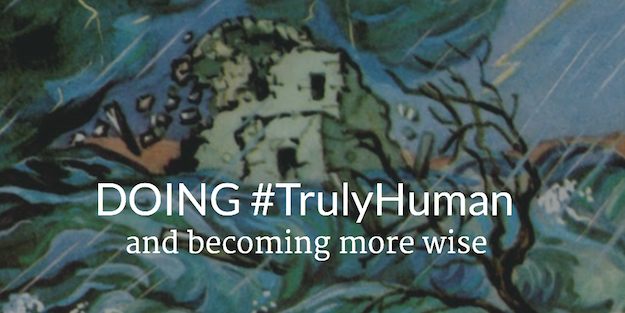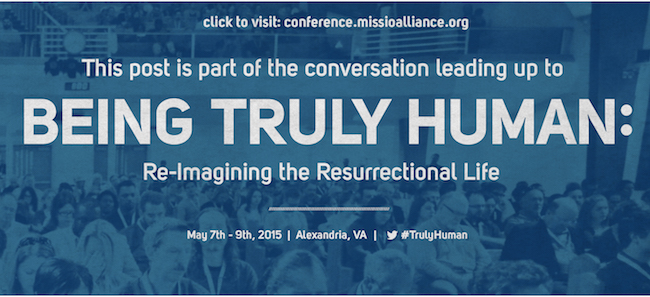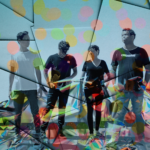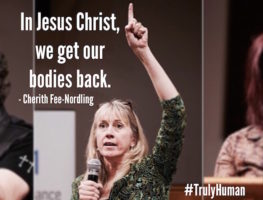I am an expert on hearing and thinking and analyzing but never doing anything about it – never laying hold of the substance of my reflection. More often than not, my body lags behind my mind. Only recently has this lag registered for me as a problem.
The problem is the illusion created by reflecting-but-never-doing. Although I feel like internally grinding over an issue accomplishes a lot, less actually happens to shape my life in the way of Jesus than I realize. Sure, I know a lot and have considered much, but the illusion – the self-deception – is that I am more mature, more human, than I truly am.
Being convinced you’re more mature than you truly are becomes a problem when you have to do things concretely in the world – when you have to live in light of who you think you are. Like an athlete who spends all his time studying the sport, but never puts into practice what he knows, I am often unable, in real time, to execute faithfully what I know. Or more likely, I never do anything because reflection feels sufficient and safe.
The illusion becomes most apparent through unexpected disappointment or loss – when the rain comes – or by entering a world where I’m forced simply to tend to the rain – because the rain forces me to live from my actual life. Transitioning completely out of the academic and into the pastoral world has been one catalyzing agent exposing the illusion. Comprehending and reflecting alone, I’m discovering, has not done the type of work that matures my body to support the moves it needs to make in lived-reality.
I realize that this discovery is, in many ways, highly personal and unique to my temperament (some of you are already going Jungian on me), but my experience, I think, points to a larger reality and a crucial piece of what becoming truly human is all about.
The ability to make the moves in lived-reality – to live deliberately in light of who I am – is what wisdom is all about, which means wisdom is crucial to living the truly human life. Becoming truly human looks like growing up into Christ, which happens as we put into practice the way of Christ, the True Human, who embodied wisdom itself.
Wisdom, like resurrection life, is not something we possess because we’ve figured it out as much as it is the fruit of participating in the grace already offered. A wise person is one who, progressively, participates in the world like a new, true human. Becoming truly human, in other words, looks like training for wisdom – learning to live deliberately the life Jesus lived on our behalf.
This means without doing the truly human thing, I will never develop wisdom for living into the true humanity. So I’m learning to be more human by doing more human – by laying hold of my humanity in Christ. When I participate in grace, that is, when I obey, I grow in wisdom and become more human.
—
The centrality of wisdom for being human, however, is often obscured by a particular way Christians have articulated the relationship between reflection and action in recent decades: the dichotomy between being and doing. Moving beyond a being/doing dichotomy to a posture of training for wisdom, it seems to me, will cultivate a more robust vision for laying hold of our true humanity in Christ.
Midway through college I first heard someone say, “The Christian life is more about being than doing.” At the time, those words were liberating for me. Because my basic disposition was that doing or not doing affected how God and others saw me (even though I knew I was saved by grace alone), I experienced shame, guilt, burnout and constantly felt like a failure. Doing the Christian thing had become bondage, so the announcement of the priority of being God’s child allowed me to receive, probably for the first time, God’s pleasure as his beloved in Christ.
While the implication of an identity grounded in God’s gracious action was (and still is) groundbreaking for receiving the scandalous reality that God does not relate to me on the basis of what I do or do not do, I found myself ill-equipped to take seriously all the ways Jesus commands us to follow him – to be a doer of the Word, as James writes, not just a listener. The announcement of beloved-ness was not materializing in the life I actually lived. I was growing in information, but not in wisdom.
Being-more-than-doing translated into un-intentionality – permission to delay or avoid responding with my body to grace – because action had not been reframed. I became like one who heard but never built his house on the rock. Being-more-than-doing left me with an underdeveloped imagination for living the truly human life.
At this juncture, a “both/and” solution seemed appropriate. Just balance both being and doing, right? Balance brings action back into the picture, but because the dichotomy still remained, balance never answered the lingering question I tried to ignore as I descended comfortably into perpetual rumination: “What does it look like, exactly, to be and not do? How does someone just be?”
Has anyone ever succeeded in doing nothing, really? Even meditative postures like quietness and stillness are embodied activities that require effort and practice, right?
Balancing both/and, it seems to me, still obscures how irreducible being is from the act of participation – how impossible it is not to make our way through the world as a participant in something. Even when we try to balance being alongside doing, because the dichotomy still exists, there remains an opaque tug between the abstract and concrete, which tends either to create cumbersome discipleship gymnastics or to downplay the fleshy, lived-quality of the true humanity.
If the truly human life has to do with deliberately living the resurrection life of Jesus, then we need wisdom, and wisdom is cultivated as we put into practice the way of Jesus – the most human thing we can do. This means we must learn (I am still learning) to step out and take hold – to throw our body into the “unforced rhythms of grace” – even before we’ve got things figured out. By stepping out in trust and doing the truly human thing, we progressively “grow up into Christ, the head” – the true human.
—
People learn to be truly human in communities of wisdom.
Growing up into the true humanity – training for wisdom – is a posture best cultivated in community, not just on the level of personal piety. A truly human community is one that lives according to wisdom and creates space for developing wisdom.
I’m learning that if a community desires for any culture to take root in everything it does, then the desired culture must be sown within the most basic structural rhythms of the community. Integration is essential. This means the truly human life (if defined as it is above) gets integrated into the structures by which the community lives through the framework of wisdom.
Without the aptitude for living deliberately in light of who we are, hard and fast rules become necessary for knowing what to do: situation X always effects solution/consequence Y. Not only can those rules become bondage, the rules can also short circuit the circumstances where we really learn to participate in the true humanity because the necessary action is determined before we have the chance to metabolize our identity through trusting obedience. We may become proficient at not breaking the rules or masters of doctrine, but we do not become mature and actually learn to live as truly human.
A community that cultivates a framework of wisdom does not run around willy-nilly but, rather, plants a clear vision for resurrection life within the operational structures themselves (e.g. in church values, finance meetings, worship service planning, etc). Then that vision is held out to the community, not as a measuring stick to keep everyone in line and call out those who are not, but rather as a way of flourishing applied through empathy and love. Space is created on all fronts for discerning (and helping people learn how to discern) what it looks like concretely to lay hold of the true humanity in the varied, particular contexts of life.
How are you learning to integrate wisdom into your community’s practices?
— [Photo by waitingfortheword, CC via Flickr]










Missio Alliance Comment Policy
The Missio Alliance Writing Collectives exist as a ministry of writing to resource theological practitioners for mission. From our Leading Voices to our regular Writing Team and those invited to publish with us as Community Voices, we are creating a space for thoughtful engagement of critical issues and questions facing the North American Church in God’s mission. This sort of thoughtful engagement is something that we seek to engender not only in our publishing, but in conversations that unfold as a result in the comment section of our articles.
Unfortunately, because of the relational distance introduced by online communication, “thoughtful engagement” and “comment sections” seldom go hand in hand. At the same time, censorship of comments by those who disagree with points made by authors, whose anger or limited perspective taints their words, or who simply feel the need to express their own opinion on a topic without any meaningful engagement with the article or comment in question can mask an important window into the true state of Christian discourse. As such, Missio Alliance sets forth the following suggestions for those who wish to engage in conversation around our writing:
1. Seek to understand the author’s intent.
If you disagree with something the an author said, consider framing your response as, “I hear you as saying _________. Am I understanding you correctly? If so, here’s why I disagree. _____________.
2. Seek to make your own voice heard.
We deeply desire and value the voice and perspective of our readers. However you may react to an article we publish or a fellow commenter, we encourage you to set forth that reaction is the most constructive way possible. Use your voice and perspective to move conversation forward rather than shut it down.
3. Share your story.
One of our favorite tenants is that “an enemy is someone whose story we haven’t heard.” Very often disagreements and rants are the result of people talking past rather than to one another. Everyone’s perspective is intimately bound up with their own stories – their contexts and experiences. We encourage you to couch your comments in whatever aspect of your own story might help others understand where you are coming from.
In view of those suggestions for shaping conversation on our site and in an effort to curate a hospitable space of open conversation, Missio Alliance may delete comments and/or ban users who show no regard for constructive engagement, especially those whose comments are easily construed as trolling, threatening, or abusive.